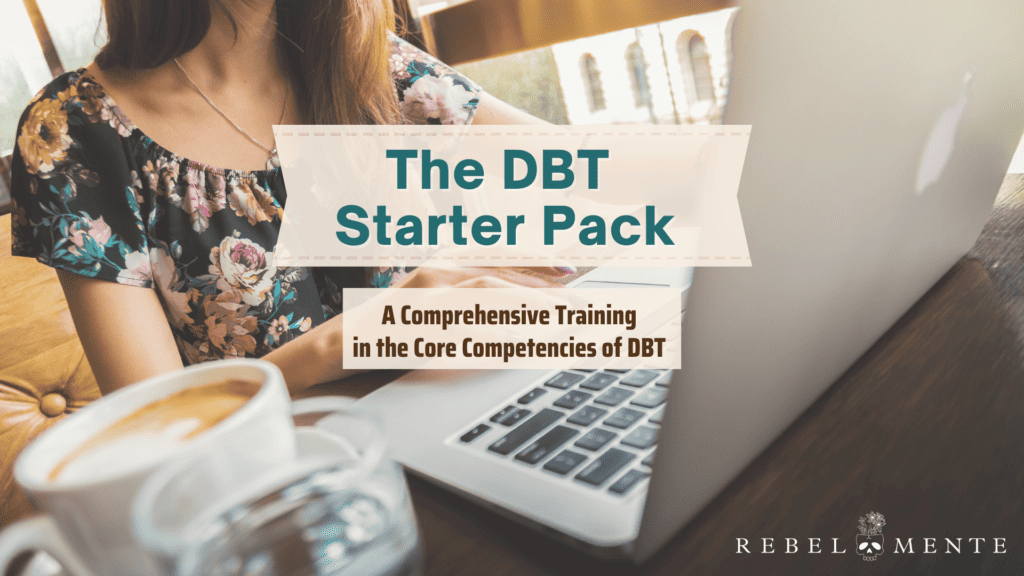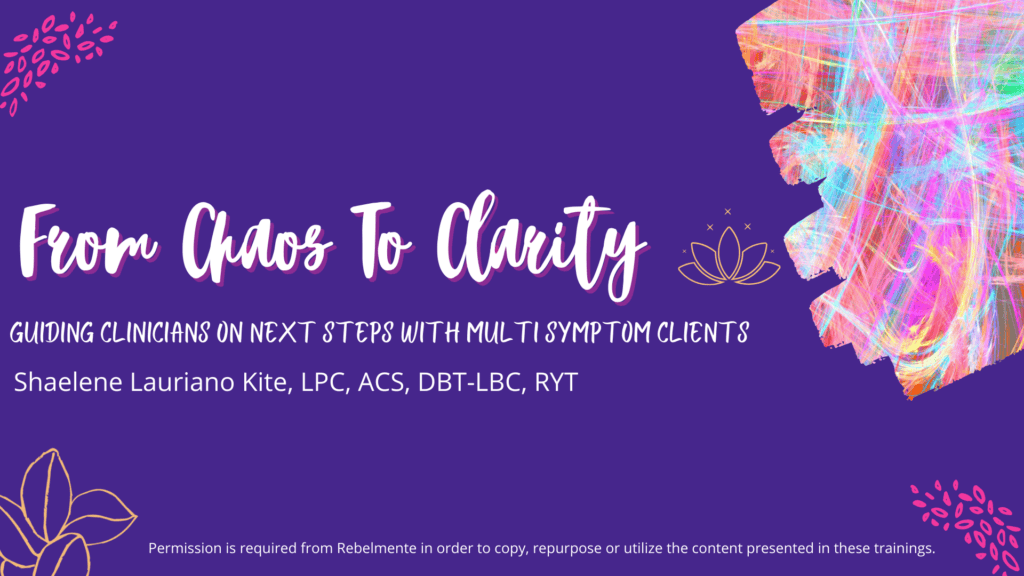Rebel Minds Learning Collective
COURSE CATALOG
Find information for all of the trainings inside the Rebel Minds Learning Collective here
Upcoming Live Training!

Applying Anti-Oppressive Concepts to DBT: Building Literacy, Fluency and Agility
LIVE Virtual Webinar: February 13, 2025
2 to 4 pm EST
PRESENTED BY:
Nathalie Edmond, PsyD, RYT-500
This training will focus on identifying racial identity development stages, tailoring conversations to meet people where they are in a trauma informed way that doesn’t activate threat and shame response, and strategies for including antiracism in clinical spaces.
- Participants will be describe four stages of racial identity development
- Participants will identify at least two contradictions in antiracism work for white bodied individuals as well as people of the Global Majority
- Participants will identify two resources for building one’s capacity to address race in the room.
Completion of this course earns 2 NBCC hours.

Applying DBT in Eating Disorder Treatment: Structure, Principles, and Best Practices
LIVE Virtual Webinar: June 12, 2025
12 to 1:30 pm EST
PRESENTED BY:
Dr. Breese Annable, PsyD/Clinical Psychology
This course, which includes the 10 hour mini-course, Facilitating Skills Groups, is a 40 hour training that will provide you with the tools needed to offer comprehensive DBT programming. The DBT Starter Pack is also ideal for teams that need to shape up new clinicians as their team grows.
This training equips clinicians to integrate DBT principles, structure, and strategies with evidence-based practices for eating disorder treatment. Attendees will learn how to conceptualize eating disorders through a DBT lens, conduct thorough eating disorder assessments, and learn the roles and functions of interdisciplinary teams. The session covers adapting DBT tools like diary cards, structuring treatment across stages, and aligning behavioral goals across multidisciplinary care. Designed for skilled clinicians, this training offers a comprehensive, actionable framework for addressing the complex needs of clients with eating disorders.
- Apply and adapt DBT principles and structure to assess and treat eating disorder behaviors in clinical practice.
- Demonstrate an understanding of the roles and functions of interdisciplinary team members in eating disorder treatment
- Apply tailored assessment strategies, including medical evaluation and level-of-care determination, for clients with eating disorders.
This training (and so many more) can be accessed through the Rebel Minds Learning Collective-an all inclusive learning community that focuses on DBT.
Completion of this course earns 1.5 NBCC hours.

DBT Starter Pack: Training In the Core Competencies of DBT
Virtual On-Demand Webinar
PRESENTED BY:
Shaelene Lauriano, LPC, DBT-LBC
& Kathryn Patrick Butts, LCSW, DBT-LBC
This course, which includes the 10 hour mini-course, Facilitating Skills Groups, is a 40 hour training that will provide you with the tools needed to offer comprehensive DBT programming. The DBT Starter Pack is also ideal for teams that need to shape up new clinicians as their team grows.
This course, which includes the 10 hour mini-course, Facilitating Skills Groups, is a 40 hour training that will provide you with the tools needed to offer comprehensive DBT programming. The DBT Starter Pack is also ideal for teams that need to shape up new clinicians as their team grows.
- Describe the research supporting DBTs efficacy
- Assess a client’s appropriateness for DBT treatment
- List the three paradigms that inform DBT theory
- Explain the Biosocial Model to clients
- List the problems and goals for each stage of DBT treatment
- List the target hierarchy for Stage 1
- List the 5 functions of DBT, and corresponding modes of treatment
- Explain the different stages, targets, and modes of treatment to clients
- List and describe two different DBT Commitment Strategies.
- Write a case conceptualize for complex clinical problems in the context of the Biosocial Model
- Describe the concept of “location perspective”
- Define what to validate in an individual DBT session
- List and define the six levels of validation
- Demonstrate reciprocal communication styles
- Explain Chain/Behavioral Analysis to a client
- List the necessary components of a complete chain analysis
- Demonstrate a solution analysis for a common stage 1 target behavior
- Demonstrate irreverent communication styles
- List the four change procedures used in DBT
- Select appropriate change procedures based on problem-assessment
- Demonstrate one level of validation
- Conduct a comprehensive chain analysis on a target behavior
- List the three elements of skills training in DBT
- Describe procedures for cognitive modification in DBT
- Describe the difference between operant and respondent learning
- List procedures for exposure strategies in-session
- List two target behaviors in DBT to which you might apply contingency management procedures
- List two personal limits that you will observe in therapy, and demonstrate orienting clients to these limits
- Describe an example of behavioral extinction
- List and describe the Dialectical Strategies
- Demonstrate the use of at least two dialectical strategies to navigate a therapy “stuck spot”
- Describe the 6 Secondary Targets/Dialectical Dilemmas in DBT
- Describe conditions when crisis strategies are required in DBT sessions
- Describe the Suicide Crisis Protocols in DBT
- Describe the function of DBT Consultation Team
- List the DBT Consultation Team agreements
- Describe the various roles for consultation team members
- Orient a new team member to the consultation team
- List common “team interfering behaviors”
This training (and so many more) can be accessed through the Rebel Minds Learning Collective-an all inclusive learning community that focuses on DBT.
Completion of this course earns 40 NBCC hours.

Leveling Up in DBT: An Advanced Training for DBT Clinicians
Virtual On-Demand Webinar
PRESENTED BY:
Shaelene Lauriano, LPC, DBT-LBC
& Kathryn Patrick Butts, LCSW, DBT-LBC
So you got trained in DBT, but now what? You know what DBT looks like on paper, but struggle to do it effectively, right? We get it, and we have been there. We know that you obtained training in DBT to help people change their lives, and that you want to do both effectively and adherently. Maybe you’ve even considered pursuing certification but don’t feel like you are hitting the mark just yet. This training was designed just for you. Leveling Up in DBT is for clinicians that have been trained in DBT and are looking for additional training in refining their skills within the four modes of DBT: Individual Therapy – Assessment, Session Structure, and Skills Phone Coaching – Structure, Targets, and Effectiveness Skills Training – Obtaining commitment, Engaging Clients and Helpful Homework Review Consultation Team – Addressing Team Interfering Behaviors, Observing Limits, and Treating Burnout
So you got trained in DBT, but now what? You know what DBT looks like on paper, but struggle to do it effectively, right? We get it, and we have been there. We know that you obtained training in DBT to help people change their lives, and that you want to do both effectively and adherently. Maybe you’ve even considered pursuing certification but don’t feel like you are hitting the mark just yet. This training was designed just for you. Leveling Up in DBT is for clinicians that have been trained in DBT and are looking for additional training in refining their skills within the four modes of DBT: Individual Therapy – Assessment, Session Structure, and Skills Phone Coaching – Structure, Targets, and Effectiveness Skills Training – Obtaining commitment, Engaging Clients and Helpful Homework Review Consultation Team – Addressing Team Interfering Behaviors, Observing Limits, and Treating Burnout
- List the 5 functions of DBT, and corresponding modes of treatment.
- Assess clients and clinical problems that are appropriate for DBT.
- Prepare a case conceptualization of a DBT client.
- Describe the structure and necessary components of a DBT individual session.
- Define each level of validation and provide an example of each.
- Describe the DBT protocol for in-session dysfunctional behavior.
- Demonstrate a chain/solution analysis with a stage 1 client.
- List the 4 change procedures in DBT and provide an example of each.
- Assess for appropriate use of environmental interventions.
- Define the “consultation to the client first” principle of DBT.
- Plan an environmental intervention that adheres to principles of DBT.
- Explain the “skills not pills” principle to a DBT client.
- Demonstrate three different commitment strategies used in the context of skills training.
- Describe the structural and functional components of a DBT skills training group session.
- List three functions of a skills coaching phone call.
- Demonstrate a DBT phone coaching call that adheres to principles and protocols of DBT.
- Describe the role of the DBT consultation team in addressing problems that arise with phone coaching.
- Describe the function of consultation team in a DBT program.
- List the roles and corresponding tasks/responsibilities.
- Assess the functionality of a DBT consultation team.
- Describe the consultation team’s role in addressing burn out of a team member.
- List common Team-Interfering Behaviors and describe how to address these on a team.
- Write an effective consultation question for a complex clinical problem.
This training (and so many more) can be accessed through the Rebel Minds Learning Collective-an all inclusive learning community that focuses on DBT.
Completion of this course earns 21 NBCC hours.

DBT Team Essentials: Defining and Refining Tools for Effective Consult Members
Virtual On-Demand Webinar
PRESENTED BY:
Shaelene Lauriano, LPC, DBT-LBC
& Kathryn Patrick Butts, LCSW, DBT-LBC
Also known as “therapy for the therapist”, clinicians apply DBT to one another in order to enhance motivation, competency and reduce burnout. Although, even after being fully trained in DBT, the intricacies of how an effective team runs are often missed. It’s hard to know “what it looks like” if you haven’t seen it before. In this 5 hour training, gain in depth teaching and practice on how to effectively gain and offer consultation alongside your team.
Also known as “therapy for the therapist”, clinicians apply DBT to one another in order to enhance motivation, competency and reduce burnout. Although, even after being fully trained in DBT, the intricacies of how an effective team runs are often missed. It’s hard to know “what it looks like” if you haven’t seen it before. In this 5 hour training, gain in depth teaching and practice on how to effectively gain and offer consultation alongside your team.
- Identify the function of the roles on a DBT consultation team.
- Summarize the DBT consultation team agreements. Create consultation questions that are relevant to treatment planning.
- Diagnose team interfering behaviors on a DBT consultation team.
This training (and so many more) can be accessed through the Rebel Minds Learning Collective-an all inclusive learning community that focuses on DBT.
Completion of this course earns 5 NBCC hours.

Cultivating the Practice of Presence: An Experiential Course on Mindfulness For Clinicians
Virtual On-Demand Webinar
PRESENTED BY:
Shaelene Lauriano, LPC, DBT-LBC
& Kathryn Patrick Butts, LCSW, DBT-LBC
Mindfulness: a term that nearly every therapist is familiar with. It is a fabulous tool for therapists in sessions, and often an effective prescription for any client. Yet, the thing about mindfulness is it’s not a skill that can be understood solely by instruction; it needs to be lived and practiced regularly. For therapists, it’s easy to lose sight of our own mindfulness practice with the busy-ness of life, but when that happens, what is the impact? In this 6 hour training series, Kathryn and Shaelene provide teaching on the topic of mindfulness, and support for therapists in establishing, maintaining, and enhancing a personal daily mindfulness practice. These webinars will provide in-depth instruction on the Core Mindfulness Skills as taught in Dialectical Behavior Therapy. Furthermore, this course will explore the broader paradigms of mindfulness primarily from a Buddhist perspective, including concepts of non-attachment, interconnection/interdependence, and impermanence. Participants will be asked to consider their own personal commitments for ongoing mindfulness practice, and instructors will provide direction and troubleshooting for common challenges that arise for dedicated practitioners of mindfulness. Participants can expect to leave this training with not only a deeper understanding of mindfulness skills, but also the framework for a personal practice that will assist their clinical work, decrease burnout and increase feelings of contentment. Note: This training meets criteria for the formal mindfulness training requirement needed for those applying for DBT-Linehan Board Certification.
Mindfulness: a term that nearly every therapist is familiar with. It is a fabulous tool for therapists in sessions, and often an effective prescription for any client. Yet, the thing about mindfulness is it’s not a skill that can be understood solely by instruction; it needs to be lived and practiced regularly. For therapists, it’s easy to lose sight of our own mindfulness practice with the busy-ness of life, but when that happens, what is the impact? In this 6 hour training series, Kathryn and Shaelene provide teaching on the topic of mindfulness, and support for therapists in establishing, maintaining, and enhancing a personal daily mindfulness practice. These webinars will provide in-depth instruction on the Core Mindfulness Skills as taught in Dialectical Behavior Therapy. Furthermore, this course will explore the broader paradigms of mindfulness primarily from a Buddhist perspective, including concepts of non-attachment, interconnection/interdependence, and impermanence. Participants will be asked to consider their own personal commitments for ongoing mindfulness practice, and instructors will provide direction and troubleshooting for common challenges that arise for dedicated practitioners of mindfulness. Participants can expect to leave this training with not only a deeper understanding of mindfulness skills, but also the framework for a personal practice that will assist their clinical work, decrease burnout and increase feelings of contentment. Note: This training meets criteria for the formal mindfulness training requirement needed for those applying for DBT-Linehan Board Certification.
- Participants will be able to develop a plan for establishing and maintaining a personal daily mindfulness practice, including troubleshooting the common challenges that arise.
- Participants will be able to explain and practice the Core Mindfulness skills as taught in Dialectical Behavior Therapy
- Participants will be able to describe broad concepts and paradigms that are fundamental to the practice of Mindfulness, including non-attachment, interconnection, and impermanence.
This training (and so many more) can be accessed through the Rebel Minds Learning Collective-an all inclusive learning community that focuses on DBT.
Completion of this course earns 6 NBCC hours.

Transforming Teen DBT: 10 Tools for Caregiver Integration
Virtual On-Demand Webinar
PRESENTED BY:
Katie K. May, LPC, DBT-LBC
This training is designed for therapists seeking effective strategies to seamlessly integrate caregivers into teen DBT sessions. Gain structured, evidence-based approaches to: -Bridge Therapeutic Practice and Home Life: Equip yourself with effective tools to guide parents in becoming essential allies in their teen’s DBT journey. -Advance Your Impact: Eliminate the guesswork in engaging parents in their teen’s therapy. Gain access to structured methods that enhance caregiver participation, reinforcing the therapeutic work done in sessions and extending its benefits into the home. -Cultivate Empowered Support Systems: Learn how to navigate obstacles with confidence, providing the structured support that catalyzes meaningful change in your clients’ lives.
This training is designed for therapists seeking effective strategies to seamlessly integrate caregivers into teen DBT sessions. Gain structured, evidence-based approaches to: -Bridge Therapeutic Practice and Home Life: Equip yourself with effective tools to guide parents in becoming essential allies in their teen’s DBT journey. -Advance Your Impact: Eliminate the guesswork in engaging parents in their teen’s therapy. Gain access to structured methods that enhance caregiver participation, reinforcing the therapeutic work done in sessions and extending its benefits into the home. -Cultivate Empowered Support Systems: Learn how to navigate obstacles with confidence, providing the structured support that catalyzes meaningful change in your clients’ lives.
- Analyze and Apply DBT Strategies: Participants will analyze the effectiveness of DBT strategies in therapeutic settings and apply these techniques to coach parents in supporting their teen’s emotional and behavioral growth, ensuring consistency between therapy sessions and home life.
- Develop and Evaluate Parental Engagement Techniques: Therapists will develop structured methods to enhance parental involvement in DBT and evaluate the impact of these techniques on the therapeutic process, aiming to extend the benefits of therapy into the family dynamic.
- Formulate and Implement Support Systems: Participants will formulate strategies to build resilient support networks for teens undergoing DBT and implement these plans to navigate common obstacles in therapy engagement, fostering a conducive environment for significant therapeutic outcomes.
This training (and so many more) can be accessed through the Rebel Minds Learning Collective-an all inclusive learning community that focuses on DBT.
Completion of this course earns 1.5 NBCC hours.

Facilitating Skills Group
Virtual On-Demand Webinar
PRESENTED BY:
Shaelene Lauriano, LPC, DBT-LBC
& Kathryn Patrick Butts, LCSW, DBT-LBC
*This 10 hour mini-course provides you with all you need to know in order to run DBT Skills groups effectively. It is a part of The DBT Starter Pack and must be completed in order to finish the full 40 hour training. This training will review: Each DBT skills module, orientation, structure of group and adapting DBT skills group for teens.
*This 10 hour mini-course provides you with all you need to know in order to run DBT Skills groups effectively. It is a part of The DBT Starter Pack and must be completed in order to finish the full 40 hour training. This training will review: Each DBT skills module, orientation, structure of group and adapting DBT skills group for teens.
See DBT Starter Pack Objectives
This training (and so many more) can be accessed through the Rebel Minds Learning Collective-an all inclusive learning community that focuses on DBT.
Completion of this course earns 10 NBCC hours.

Integrating DBT into Couple & Family Sessions
Virtual On-Demand Webinar
PRESENTED BY:
Ashlee Maruca, LPC
In this training, clinicians will learn specific skills and interventions that can be used with their clients to improve their relationships.
In this training, clinicians will learn specific skills and interventions that can be used with their clients to improve their relationships.
- Describe the importance of working with the family or partner of a client, rather than just the individual.
- Apply specific in-session interventions with families and couples to improve support amongst the family and overall treatment outcomes.
- Identify the steps required to help a client accurately express their emotion.
This training (and so many more) can be accessed through the Rebel Minds Learning Collective-an all inclusive learning community that focuses on DBT.
Completion of this course earns 1 NBCC hour.

Tailoring DBT for Autistic Clients
Virtual On-Demand Webinar
PRESENTED BY:
Dr. Amara Brook, PhD, ABPP
& Rachel Leah Kraus, LCSW-C
DBT therapists often report that the most taxing component of their work as a DBT therapist is phone coaching. Though phone coaching is a core component of DBT treatment, many providers have not received training specific to this modality, oftentimes leaving them feeling underprepared and overwhelmed. If you are wanting to provide DBT as its prescribed without compromising your sanity, this training is for you.
DBT therapists often report that the most taxing component of their work as a DBT therapist is phone coaching. Though phone coaching is a core component of DBT treatment, many providers have not received training specific to this modality, oftentimes leaving them feeling underprepared and overwhelmed. If you are wanting to provide DBT as its prescribed without compromising your sanity, this training is for you.
- Describe 1-2 strategies for DBT telephone contact.
- Demonstrate ability to orient a client to personal limits as a DBT provider.
- Identify a clinical circumstance in which scheduled calls are indicated.
- Demonstrate effective consultation in the mode of phone coaching.
- traits of many autistic people and why these may call for modifications to standard DBT.
- Learners will be able to identify two specific ways that they can modify their own DBT practice to increase efficacy for autistic clients.
This training (and so many more) can be accessed through the Rebel Minds Learning Collective-an all inclusive learning community that focuses on DBT.
Completion of this course earns 6 NBCC hours.
Sign Up Now to Gain Access to All the Trainings Inside the Rebel Minds Learning Collective

From Chaos To Clarity: Guiding Clinicians On Next Steps With Multi-Symptom Clients
Virtual On-Demand Webinar
PRESENTED BY:
Shaelene Lauriano, LPC, DBT-LBC
Have you had the experience of going into session with a clear plan, only for it to go all wrong? If you are a clinician feeling overwhelmed, underprepared or even afraid for your multi symptom clients, this training is for you. Learn my simple 4 step method to help you gain clarity when conceptualizing your clients that often find themselves in crisis mode.
Have you had the experience of going into session with a clear plan, only for it to go all wrong? If you are a clinician feeling overwhelmed, underprepared or even afraid for your multi symptom clients, this training is for you. Learn my simple 4 step method to help you gain clarity when conceptualizing your clients that often find themselves in crisis mode.
- Apply the 4 step method used to conceptualize your cases.
- List your client issues in a set of targets to increase and decrease.
- Distinguish high priority targets from lower priority targets with your multi symptom clients.
This training (and so many more) can be accessed through the Rebel Minds Learning Collective-an all inclusive learning community that focuses on DBT.
This course does not provide NBCC hours.

Unboxing Gender 101: Adapting DBT for Trans Clients
Virtual On-Demand Webinar
PRESENTED BY:
Kieran McMonagle, LMFT
Unboxing Gender is a transformative course that delves into stories on trans youth alongside poignant experiences, such as Kieran’s, illustrating the impact of societal invalidation through a DBT lens with lectures, case stories, and discussions, therapists confront the stark realities faced by trans individuals. The training explores diverse perspectives on gender, encouraging personal reflection and empathy. Participants engage in activities to understand the harm of defending gender norms and the importance of gender-affirming care as suicide prevention. By the course’s end, therapists gain a deeper understanding of gender, empowering them to provide compassionate, affirming care to trans youth and individuals. This training contributes to suicide prevention efforts and fosters a more inclusive society.
Unboxing Gender is a transformative course that delves into stories on trans youth alongside poignant experiences, such as Kieran’s, illustrating the impact of societal invalidation through a DBT lens with lectures, case stories, and discussions, therapists confront the stark realities faced by trans individuals. The training explores diverse perspectives on gender, encouraging personal reflection and empathy. Participants engage in activities to understand the harm of defending gender norms and the importance of gender-affirming care as suicide prevention. By the course’s end, therapists gain a deeper understanding of gender, empowering them to provide compassionate, affirming care to trans youth and individuals. This training contributes to suicide prevention efforts and fosters a more inclusive society.
- Describe definitions of gender and how different folks experience gender.
- Introduce gender as a galaxy vs older models of gender.
- Interpret gender affirming care as suicide prevention.
- Understand the connection between growing up in an invalidating environment and how that increases experience of mental health symptoms.
- State statistics and tell two stories of the effects of invalidating society on trans folks.
This training (and so many more) can be accessed through the Rebel Minds Learning Collective-an all inclusive learning community that focuses on DBT.
Completion of this course earns 1.5 NBCC hours.

Phone Coaching: Keeping Adherence Without Losing Your Sanity
Virtual On-Demand Webinar
PRESENTED BY:
Shaelene Lauriano, LPC, DBT-LBC
& Kathryn Patrick Butts, LCSW, DBT-LBC
Autistic individuals often struggle with emotion recognition, regulation, suicidality, and self-harm. In a society prone to invalidating their experiences, they face chronic traumatic invalidation and shame, sometimes responding with masking and camouflaging behaviors, exacerbating emotion dysregulation and suicide risk. DBT, guided by biosocial theory, offers promising avenues for improvement. Recent research indicates DBT skills training can aid Autistic individuals, with ongoing studies exploring enhancements for accessibility, effectiveness, and harm prevention. Dr. Amara Brook and Rachel Kraus combine lived experience of being Autistic with intensive training and experience providing DBT to Autistic clients. They highlight ways to recognize Autistic clients and to modify DBT to optimally help Autistic clients move toward their life worth living goals.
Autistic individuals often struggle with emotion recognition, regulation, suicidality, and self-harm. In a society prone to invalidating their experiences, they face chronic traumatic invalidation and shame, sometimes responding with masking and camouflaging behaviors, exacerbating emotion dysregulation and suicide risk. DBT, guided by biosocial theory, offers promising avenues for improvement. Recent research indicates DBT skills training can aid Autistic individuals, with ongoing studies exploring enhancements for accessibility, effectiveness, and harm prevention. Dr. Amara Brook and Rachel Kraus combine lived experience of being Autistic with intensive training and experience providing DBT to Autistic clients. They highlight ways to recognize Autistic clients and to modify DBT to optimally help Autistic clients move toward their life worth living goals.
- Learners will be able to explain the difference between the deficit-based model versus the neurodiversity model in understanding and serving clients.
- Learners will be able to describe two traits of many autistic people and why these may call for modifications to standard DBT.
- Learners will be able to identify two specific ways that they can modify their own DBT practice to increase efficacy for autistic clients.
This training (and so many more) can be accessed through the Rebel Minds Learning Collective-an all inclusive learning community that focuses on DBT.
Completion of this course earns 1.5 NBCC hours.
Questions + Special Accommodations?
Contact us at hello@rebelmente.com

Rebelmente, LLC has been approved by NBCC as an Approved Continuing Education Provider, ACEP No. 7325. Programs that do not qualify for NBCC credit are clearly identified.
Rebelmente, LLC is solely responsible for all aspects of the programs.
